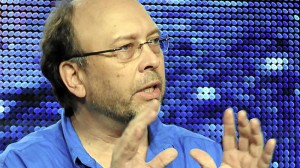A hundred years after Titanic went down, History Channel’s two-hour special, “Titanic Mystery Solved,” answers long-held questions about the sinking of the historic vessel.
In an exclusive phone interview with the Inquirer, Carl Lindahl, the cable network’s executive producer of historical programs, and writer-producer Rushmore Denooyer said that this massive undertaking took nearly three years to finish.
“Previous expeditions only photographed the bow and the stern of the ship,” Lindahl said. “What was photographed and investigated was only 60 percent of what’s down there. The remaining 40 percent that you’ll see here are segments of Titanic that no one even knew existed. You’ll see all the pieces and a map of the entire field of debris, which will forever be used by anybody who wants to study the Titanic.”
AUVs, or Autonomous Underwater Vehicles, scanned the wreck site. Gathered data were patched and “composited” onto a large image, Denooyer said. Crew members from different technical fields lent their expertise in the effort.
“The expedition was unique in a number of ways—in technology certainly, but also in the team’s makeup,” Denooyer added. “There was tremendous diversity [in the] groups and institutes that were involved… I don’t think any previous expedition has had such a broad and deep range of scientific and engineering [experts] and historians.”
Lindahl and Denooyer agreed that this collaboration was crucial to the painstaking task of studying thousands of pieces discovered over several square miles.
Unique enigma
“The expedition took place at the beginning of fall in 2010, but planning started about a year before that,” Lindahl revealed. “After the expedition was over, it took a year and a half to analyze the findings. Literally hundreds, perhaps thousands of hours of materials had to be viewed, screened, analyzed and compared by all the different agencies that were involved in the expedition.”
The Titanic disaster is a unique enigma that has baffled and intrigued generations, noted both Lindahl and Denooyer. “I think the story of Titanic has an enduring appeal on human imagination for a number of reasons,” Denooyer said. “It’s symbolic in a way; man creates technology—we convince ourselves that it is so good that it’s more powerful than nature. And of course, when we think that we are eventually proven wrong. It also has the human side of it where you can’t think about that night without imagining, ‘What would I have done if I had been there?’ I think that for all these reasons, it retains a hold on our imagination, and in a way, is timeless.”
“It fascinates people because it hits them on many different levels,” Lindahl added. “It’s human drama with a great loss of life, but it’s also a story of the failure of technology, of science that people thought then they had mastered.”
(“Titanic Mystery Solved” airs tonight at 8, on History Channel.)
